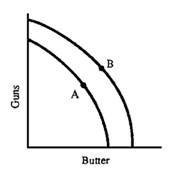Exam 3: The Fundamental Economic Problem: Scarcity and Choice
Exam 1: What Is Economics261 Questions
Exam 2: The Economy: Myth and Reality185 Questions
Exam 3: The Fundamental Economic Problem: Scarcity and Choice290 Questions
Exam 4: Supply and Demand: an Initial Look337 Questions
Exam 5: Consumer Choice: Individual and Market Demand243 Questions
Exam 6: Demand and Elasticity254 Questions
Exam 7: Production, Inputs, and Cost: Building Blocks for Supply Analysis260 Questions
Exam 8: Output, Price, and Profit: the Importance of Marginal Analysis234 Questions
Exam 9: The Financial Markets and the Economy: the Tail That Wags the Dog227 Questions
Exam 10: The Firm and the Industry Under Perfect Competition253 Questions
Exam 11: The Case for Free Markets: the Price System259 Questions
Exam 12: Monopoly244 Questions
Exam 13: Between Competition and Monopoly254 Questions
Exam 14: Limiting Market Power: Antitrust and Regulation155 Questions
Exam 15: The Shortcomings of Free Markets219 Questions
Exam 16: Externalities, Externaliteis, the Environment, and Natural Resources222 Questions
Exam 17: Taxation and Resource Allocation221 Questions
Exam 18: Pricing the Factors of Production233 Questions
Exam 19: Labor and Entrepreneurship: the Human Inputs271 Questions
Exam 20: Poverty, Inequality, and Discrimination171 Questions
Exam 21: International Trade and Comparative Advantage226 Questions
Exam 22: Contemporary Issues in the Us Economy23 Questions
Select questions type
A recent study found that it was cheaper to buy a chicken dinner from Kentucky Fried Chicken than it was to prepare it at home. The researcher included all costs including the imputed value of time involved to prepare the meal at home. This study illustrates the
(Multiple Choice)
4.8/5  (39)
(39)
All actions and purchases, even those of wealthy people, involve a sacrifice.
(True/False)
4.8/5  (26)
(26)
Adam Smith's book, one of the first systematic treatments of economics, was entitled
(Multiple Choice)
4.8/5  (34)
(34)
The production possibilities frontier can show a manufacturer's possible combinations of output resulting from the combination of two goods.
(True/False)
4.8/5  (37)
(37)
Adam Smith noted that people are adept at pursuing their own self-interests, and that ____ harnesses this self-interest remarkably well.
(Multiple Choice)
4.8/5  (42)
(42)
The workers in Adam Smith's famous pin factory, who were proficient in pin production, faced the problem of
(Multiple Choice)
4.8/5  (46)
(46)
In a market system, the major coordination tasks are carried out
(Multiple Choice)
4.8/5  (39)
(39)
Any point on or outside the production possibilities frontier is attainable.
(True/False)
4.8/5  (31)
(31)
A typical economy produces thousands of different goods. Is it accurate to say that society faces a production possibilities frontier?
(Multiple Choice)
4.9/5  (31)
(31)
Economics studies the logic of choices made from among available possibilities.
(True/False)
4.9/5  (40)
(40)
Some economies have production possibilities frontiers that are bowed inward toward the origin.
(True/False)
4.9/5  (42)
(42)
Figure 3-3
 In Figure 3-3, a shift from A to B seems most consistent with which of the following scenarios?
In Figure 3-3, a shift from A to B seems most consistent with which of the following scenarios?
(Multiple Choice)
4.8/5  (44)
(44)
For a given production possibilities frontier, which points are attainable?
(Multiple Choice)
5.0/5  (37)
(37)
Scarcity is a concept that applies to all of the following except
(Multiple Choice)
4.9/5  (36)
(36)
The opportunity cost of a college education includes wages lost while enrolled in school.
(True/False)
4.8/5  (38)
(38)
If the U.S. government decides to increase military spending, a possible opportunity cost could be lower spending on education.
(True/False)
4.8/5  (39)
(39)
Efficient production can be carried out anywhere on or beyond the production possibilities frontier.
(True/False)
4.7/5  (33)
(33)
The scarcity of physical resources is far more fundamental to the study of economics than the scarcity of funds.
(True/False)
4.9/5  (30)
(30)
A society can occasionally produce at a point beyond its production possibilities frontier if there is an economic crisis.
(True/False)
4.8/5  (28)
(28)
Showing 41 - 60 of 290
Filters
- Essay(0)
- Multiple Choice(0)
- Short Answer(0)
- True False(0)
- Matching(0)